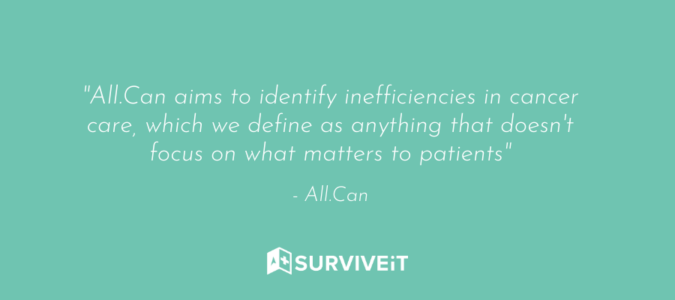All.Can Reports on Cancer Care Inefficiencies from the Patients’ Perspective

All.Can is an amazing organization that puts patients at the center of the conversation around cancer. Through research, it’s been able to identify and spearhead initiatives all over the world.
“All.Can aims to identify inefficiencies in cancer care, which we define as anything that doesn’t focus on what matters to patients. Through research and collaboration, we highlight best practices and develop policy recommendations to improve cancer care for all.” All.Can
The latest publication is an ebook with findings from an international cancer patient survey focused on the inefficiencies in cancer care and identifying opportunities for improvement.
Patient insights on cancer care: opportunities for improving efficiency
Source: all-can.org
Key opportunities identified to improve efficiency in cancer care.
Overall, the majority of survey respondents reported that their needs were sufficiently addressed during their care. However, the survey highlighted four crucial areas where respondents reported that they experienced inefficiency and where there are opportunities for improvement.
1. Swift, accurate and appropriately delivered diagnosis
Diagnosis was not always communicated to respondents in the most appropriate way. Respondents sometimes reported a lack of empathy from physicians, along with poor timing. For example, some were told they had cancer without a family member present, or had to wait several days to speak to a specialist after receiving their diagnosis.
When asked to select the one area of cancer care where they experienced the most inefficiency, 26% of respondents chose diagnosis – more than any other area of cancer care.
Across all cancer types, 58% of respondents had their cancer detected outside of a screening programme. As might be expected, this varied considerably by cancer type.
Among respondents whose cancer was detected outside of a screening programme, delayed diagnosis (>6 months) was associated with a more negative patient view of all aspects of care and support.
Time to diagnosis varied significantly by cancer type: nearly 80% of prostate cancer respondents whose cancer was detected outside of screening said their cancer was diagnosed in less than a month, while for head and neck cancer respondents diagnosed outside of screening this was only 25%.
Nearly a third (32%) of respondents whose cancer was detected outside of a screening programme reported that their cancer was initially diagnosed as something different – and, again, this varied considerably by cancer type.
2. Information, support and shared decision-making
In qualitative responses, respondents said that they felt overwhelmed because too much information was given at once, and they would have preferred to receive relevant information at appropriate points along the entire care pathway.
Nearly a third of respondents (31%) felt they were not given adequate information about their cancer care and treatment in a way that they could understand. Additionally, only half of respondents (53%) felt they were sufficiently involved in making decisions about their care.
Nearly two in five respondents (39%) felt they had inadequate support to deal with ongoing symptoms and side effects, both during and beyond active treatment. In particular, nearly a third (31%) felt that they lacked adequate information and care for dealing with the pain they experienced.
Respondents reported a lack of information and support on what to expect after their phase of active treatment was over.
Specifically, more than a third of respondents (35%) felt inadequately informed about how to recognise whether their cancer might be returning or getting worse.
Gaps in information and support along the entire care pathway were more prevalent among those with more advanced cancers – reflecting similar findings in the literature that the support needs of these patients are often less well met than are those of patients with earlier-stage cancer.
Read about the other two areas highlighted as insufficient (Integrated multidisciplinary care and the financial impact of cancer) in the All.Can ebook, as well as other cancer patient insights.
Cancer Patient Advocacy
SURVIVEiT® aims to enable cancer patients to advocate for themselves. This important work that All.Can is doing provides valuable insight into the current cancer patient experience. By identifying cancer care inefficiencies, we can continue to find ways to support patients and caregivers with cancer resources.
